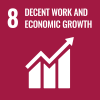Ressano Garcia, 7 November 2022 – Felix Nandza is the father of six and has been working in South Africa’s mines for the past 25 years while his family remains in Maputo, Mozambique.
Following the birth of his first child in 1997, Nandza attended a three-month training in South Africa. Afterwards, sensing an opportunity to provide for his family, he made the difficult decision to leave his young family behind and began working as a repairman to maintain compression water pumps used in gold mines.
“My passion and desire to support and secure a decent life for my family was clear. And so, I went to work in the mines in South Africa, where I continue to work until this day," Nandza explains.
Nandza was fortunate to have learned a skill that earns enough money to have met his family’s needs all these years. Of particular pride is his eldest son, who now works as a doctor in Cabo Delgado.
"Living away from my family is a difficult thing. I missed out on many important moments in the lives of my children during their adult years. I also missed some birthdays and important days," Nandza recounts. “But I can only say that I feel proud of my wife, myself and my children because I contributed to securing a decent life for them. They are now on the right path. The path that every parent desires for their children."


Upon travelling to South Africa to work, migrant workers are assisted by IOM's medical health team with specialized medical checks and assessments. Photo: IOM/Moayad Zaghdani and Gerson Fanequico
Besides the weight of being absent from his family’s life, Nandza continues to face serious health risks as a mineworker – silicosis arising from prolonged exposure to silica dust produced in gold mining, high levels of HIV, and increased risk of contracting tuberculosis (TB) and other lung diseases. The southern provinces of Mozambique bordering South African have some of the highest incidences of HIV and TB.




Over the past two years, over 20,000 migrant workers have benefited from the occupational health centres’ services. Photo: IOM/Moayad Zaghdani
Health-care services in South Africa and Mozambique often fail to reach mineworkers before they become ill with TB, HIV, and lung diseases, leading to preventable morbidity and mortality due to occupational illnesses, or exacerbating limited access to compensation schemes.
"When you have tuberculosis or any other disease, you run the risk of being told that you can no longer work and you need to stay at home. Having this clinic helps those infected with tuberculosis, silicosis and other diseases, because when detected early, treatment is a lot more effective. Many have died without even knowing that they were sick," Nandza says.
The International Organization for Migration (IOM) supports the Mozambican Government to run three occupational health centres in Ressano Garcia, Xai Xai and Mandlakazi. The centres provide early detection and specialized diagnosis of occupational lung conditions to better protect migrant mineworkers’ health, and to inform policymakers on strategies for disease prevention among this vulnerable group.
Since October 2020, when the project began, more than 21,000 occupational health screenings have been provided with over 2,700 people who had abnormal results referred for medical support and follow-up. Having established a direct cross-border referral system for compensation in April 2022 with the South Africa Government, IOM has supported 59 mineworkers with submitting compensation claims to the South Africa Bureau of Occupational Diseases.
IOM's occupational health centres in Ressano Garcia, Xai Xai, and Mandlakazi are financed by the Ministry of Health of Mozambique and the World Bank.
This story was written by Moayad Zaghdani with support from Gerson Fanequiço, part of IOM’s Communication Team in Mozambique.



